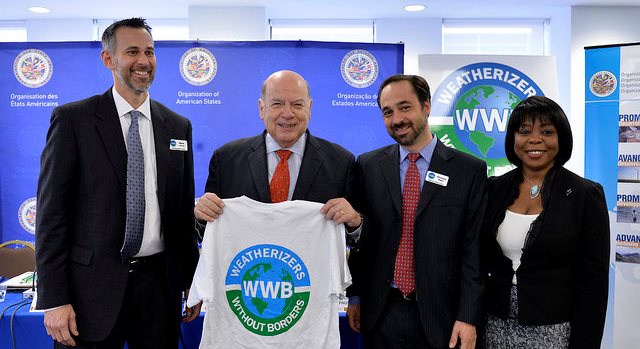
Increasing energy access across the Americas requires inclusive policies targeting vulnerable segments of society, promoting energy efficiency, and ensuring stable access to reliable energy services. On February 27, the Department of Sustainable Development of the OAS and the Energy and Climate Partnership of the Americas (ECPA), convened a Public Discussion Forum on Energy Efficiency in low-income housing in Washington, DC. The forum offered an opportunity to analyze Mexico’s, the United States’ and Uruguay’s practices in energy efficiency for low-income households as countries in the region embark in the creation of similar policies and programs.
Experiences in the implementation of the Weatherization Assistance Program (WAP) were shared. The WAP is a public policy managed by U.S. Department of Energy (DOE) since 1976, which has produced remarkable results in terms of energy savings and poverty reduction. WAP consists in training new green workers in house retrofitting and energy auditing to carry out cost-effective retrofits to achieve energy savings and improve health and safety conditions in homes. This program has proven effective in energy consumption reduction throughout the United States, enhancing energy and currency savings, reducing energy dependency, pollution and household energy expenditure, while improving life quality for people.
OAS Secretary General, Jose Miguel Insulza, opened the forum by referring to ECPA as “an important and useful tool in promoting change towards renewable energy and energy efficiency in the region,” and an initiative that “has helped foster partnerships for greater dialogue, collaboration and awareness among governments, multilateral organizations, NGOs, the private sector and academia.”

U.S. Congressman Paul Tonko, also participating in the opening session, emphasized his country’s nearly forty-years of experience in the implementation of WAP which provides a valuable example of how governments may support the reduction of energy consumption and dependency, while improving quality of life for people. In this regard, he noted “this type of exercise ¾where we translate and transfer a program from one nation to another¾ is exactly the type of international coordination and cooperation that we need.” In expressing his support for the program, Congressman Tonko suggested that “energy efficiency should be our fuel-of-choice. It is the least expensive, most environmentally beneficial fuel we have.”
Ambassador Emilio Rabasa, Permanent Representative of Mexico to the OAS, highlighted the importance of the exchange in preparation for the next ECPA ministerial meeting, to be held on May 25-26 in Mérida, Yucatán, stating that the high-level meeting “will serve to reaffirm the commitment of governments to clean energy and climate efficiency.” Since 2011, Mexico chairs the ECPA Energy Efficiency Working Group, providing know-how, best practices and technical support to the countries of the Americas in energy efficiency, conservation and savings. More than 30 countries benefited from Mexico’s technical and policy making support in this field.
The inaugural session concluded with remarks by Ambassador Hugo Cayrus, Permanent Representative of Uruguay to the OAS, underlining the links between energy efficiency and the promotion of equality. Ambassador Cayrus explained how Uruguay’s energy policy is “conceived to improve the quality of life of people in vulnerable socio-economic settings and ease the access of the population, by promoting a culture of efficient and safe use of resources and optimizing investments.”
 View Map
View Map